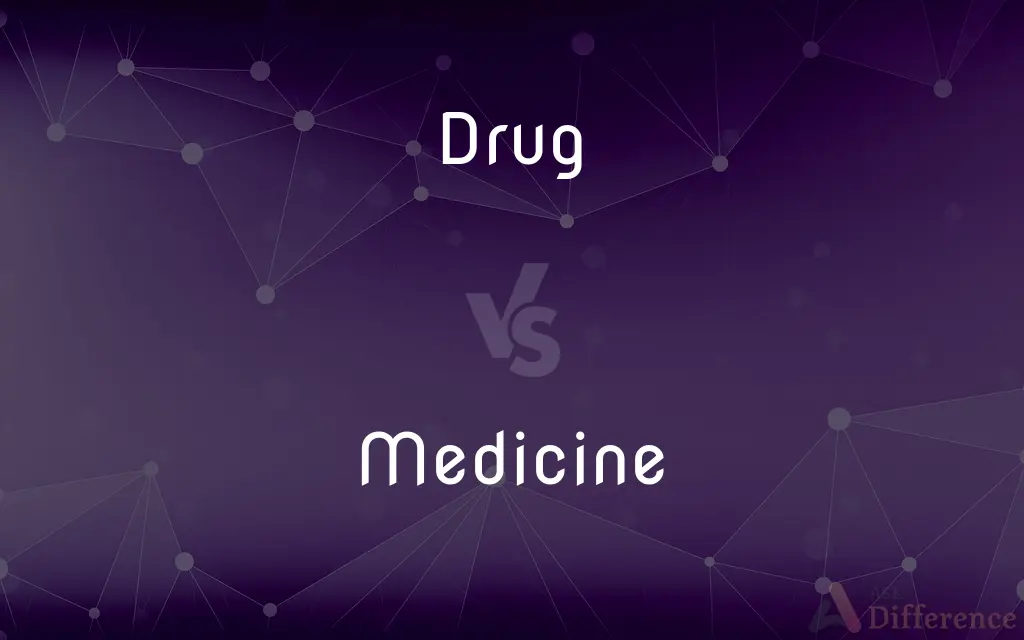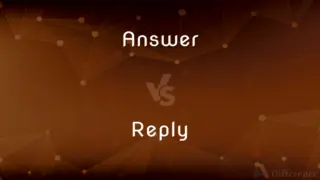Drug vs. Medicine — What's the Difference?
Edited by Tayyaba Rehman — By Urooj Arif — Updated on March 15, 2024
Drugs are substances that can alter bodily functions, whereas medicines are drugs specifically intended to prevent or treat diseases.

Difference Between Drug and Medicine
Table of Contents
ADVERTISEMENT
Key Differences
Drugs are broad categories of substances that affect the body's physiology in various ways, capable of causing both beneficial and adverse effects depending on their use. Whereas, medicines are a subset of drugs designed with the purpose of diagnosing, treating, or preventing diseases, aiming for therapeutic outcomes.
Drugs can be legal or illegal, encompassing prescription medications, over-the-counter treatments, and substances used recreationally or addictively. Medicines, on the other hand, are regulated substances approved by health authorities for medical use, emphasizing safety and efficacy.
The development of drugs involves rigorous research and testing to understand their pharmacological effects, interactions, and potential side effects. In contrast, the development of medicines focuses on therapeutic efficacy, dosing, and minimizing adverse effects, ensuring they meet stringent regulatory standards for medical applications.
Drugs may alter mood, perception, or consciousness, including substances not necessarily intended for health improvement, such as recreational drugs. Medicines are specifically designed to improve health, either by curing, managing symptoms, or preventing diseases, with a clear medical application.
While all medicines are drugs, not all drugs are considered medicines. This distinction is crucial in the context of legality, usage, and societal perception, reflecting the intended use and regulatory status of these substances.
ADVERTISEMENT
Comparison Chart
Definition
Substances that can alter physical or mental state
Drugs used to diagnose, treat, or prevent diseases
Purpose
Broad, including recreational and research
Specifically for therapeutic purposes
Regulatory Status
Can be legal or illegal
Regulated and approved for medical use
Development Process
Focus on understanding effects and interactions
Focus on efficacy, safety, and therapeutic benefit
Example
Caffeine, alcohol, cocaine
Antibiotics, vaccines, pain relievers
Compare with Definitions
Drug
A substance that alters physiological function.
Caffeine is a drug that can increase alertness.
Medicine
A drug used for medical treatment.
Insulin is a medicine for diabetes management.
Drug
Includes over-the-counter substances.
Ibuprofen is a drug available without a prescription.
Medicine
Focuses on therapeutic outcomes.
Antidepressants are medicines used to treat depression.
Drug
Broad term encompassing many substances.
Various drugs are studied for their potential medical applications.
Medicine
Can be prescribed or over-the-counter.
Some pain relievers are medicines that can be bought without a prescription.
Drug
May have legal or illegal status.
Prescription drugs are legal when used correctly.
Medicine
Undergoes rigorous testing for approval.
New medicines must be approved by the FDA before public use.
Drug
Can be used recreationally or for research.
Cannabis is used as a recreational drug in some regions.
Medicine
Intended to diagnose, treat, or prevent diseases.
Vaccines are medicines that prevent infectious diseases.
Drug
A drug is any substance that causes a change in an organism's physiology or psychology when consumed. Drugs are typically distinguished from food and substances that provide nutritional support.
Medicine
Medicine is the science and practice of caring for a patient, managing the diagnosis, prognosis, prevention, treatment, palliation of their injury or disease, and promoting their health. Medicine encompasses a variety of health care practices evolved to maintain and restore health by the prevention and treatment of illness.
Drug
A medicine or other substance which has a physiological effect when ingested or otherwise introduced into the body
A new drug aimed at sufferers from Parkinson's disease
Medicine
The science or practice of the diagnosis, treatment, and prevention of disease (in technical use often taken to exclude surgery)
He made distinguished contributions to pathology and medicine
The remarkable achievements of modern medicine
Drug
Administer a drug to (someone) in order to induce stupor or insensibility
They were drugged to keep them quiet
Medicine
A drug or other preparation for the treatment or prevention of disease
Your doctor will be able to prescribe medicines
Give her some medicine
Drug
A substance used in the diagnosis, treatment, or prevention of a disease or as a component of a medication.
Medicine
(especially among some North American Indian peoples) a spell, charm, or fetish believed to have healing, protective, or other power
Fleur was murdering him by use of bad medicine
Drug
Such a substance as recognized or defined by the US Food, Drug, and Cosmetic Act.
Medicine
The science and art of diagnosing and treating disease or injury and maintaining health.
Drug
A chemical substance, such as a narcotic or hallucinogen, that affects the central nervous system, causing changes in behavior and often addiction.
Medicine
The branch of this science encompassing treatment by drugs, diet, exercise, and other nonsurgical means.
Drug
(Obsolete) A chemical or dye.
Medicine
The practice of medicine.
Drug
To administer a drug to, especially to treat pain or induce anesthesia.
Medicine
A substance, especially a drug, used to treat the signs and symptoms of a disease, condition, or injury.
Drug
To give a drug to, especially surreptitiously, in order to induce stupor.
Medicine
Something that serves as a remedy or corrective
Medicine for rebuilding the economy.
Measures that were harsh medicine.
Drug
To poison or mix (food or drink) with a drug.
Medicine
Shamanistic practices or beliefs, especially among Native Americans.
Drug
(pharmacology) A substance used to treat an illness, relieve a symptom, or modify a chemical process in the body for a specific purpose.
Aspirin is a drug that reduces pain, acts against inflammation and lowers body temperature.
The revenues from both brand-name drugs and generic drugs have increased.
Medicine
Something, such as a ritual practice or sacred object, believed to control natural or supernatural powers or serve as a preventive or remedy.
Drug
A psychoactive substance, especially one which is illegal and addictive, ingested for recreational use, such as cocaine.
Take drugs
She used to be a drug addict
Medicine
A substance which specifically promotes healing when ingested or consumed in some way; a pharmaceutical drug.
This medicine has fewer adverse effects than others in its drug class.
Using a weekly pill organizer is a good way to help remind yourself to take your medicine each day, and it also tells you whether you already took today's pills (it's not unusual to forget doing a habitual task)!
Drug
Anything, such as a substance, emotion, or action, to which one is addicted.
Medicine
Any treatment or cure.
A legislative remedy might be some harsh medicine; is that cure worse than the ill?
Drug
Any commodity that lies on hand, or is not salable; an article of slow sale, or in no demand.
Medicine
(uncountable) The study of the cause, diagnosis, prognosis and treatment of disease or illness.
She's studying medicine at university because she wants to be a doctor in the future.
Drug
(transitive) To administer intoxicating drugs to, generally without the recipient's knowledge or consent.
She suddenly felt strange, and only then realized she'd been drugged.
Medicine
(uncountable) The profession and practice of physicians, including surgeons.
The history of medicine can be discretized into eras with differing relationships between physicians and surgeons
Drug
(transitive) To add intoxicating drugs to with the intention of drugging someone.
She suddenly felt strange. She realized her drink must have been drugged.
Medicine
The profession and practice of nonsurgical physicians as sometimes distinguished from that of surgeons.
The evolving relationship of medicine to surgery in the nineteenth century
Drug
(intransitive) To prescribe or administer drugs or medicines.
Medicine
(uncountable) Ritual magic used, as by a medicine man, to promote a desired outcome in healing, hunting, or warfare; traditional medicine.
Drug
(dialect) drag
You look like someone drug you behind a horse for half a mile.
Look what the cat drug in
Medicine
Among the Native Americans, any object supposed to give control over natural or magical forces, to act as a protective charm, or to cause healing.
Drug
To drudge; to toil laboriously.
Medicine
(obsolete) Black magic, superstition.
Drug
To prescribe or administer drugs or medicines.
Medicine
(obsolete) A philter or love potion.
Drug
To affect or season with drugs or ingredients; esp., to stupefy by a narcotic drug. Also Fig.
The laboring masses . . . [were] drugged into brutish good humor by a vast system of public spectacles.
Drug thy memories, lest thou learn it.
Medicine
(obsolete) A physician.
Drug
To tincture with something offensive or injurious.
Drugged as oft,With hatefullest disrelish writhed their jaws.
Medicine
(slang) Recreational drugs, especially alcoholic drinks.
Drug
To dose to excess with, or as with, drugs.
With pleasure drugged, he almost longed for woe.
Medicine
To treat with medicine.
Drug
A drudge .
Medicine
The science which relates to the prevention, cure, or alleviation of disease.
Drug
Any animal, vegetable, or mineral substance used in the composition of medicines.
Whence merchants bringTheir spicy drugs.
Medicine
Any substance administered in the treatment of disease; a remedial agent; a medication; a medicament; a remedy; physic.
By medicine, life may be prolonged.
Drug
Any commodity that lies on hand, or is not salable; an article of slow sale, or in no demand; - used often in the phrase "a drug on the market".
And virtue shall a drug become.
Medicine
A philter or love potion.
Drug
Any stuff used in dyeing or in chemical operations.
Medicine
A physician.
Drug
Any substance intended for use in the treatment, prevention, diagnosis, or cure of disease, especially one listed in the official pharmacopoeia published by a national authority.
Medicine
Among the North American Indians, any object supposed to give control over natural or magical forces, to act as a protective charm, or to cause healing; also, magical power itself; the potency which a charm, token, or rite is supposed to exert.
The North American Indian boy usually took as his medicine the first animal of which he dreamed during the long and solitary fast that he observed at puberty.
Drug
Any substance having psychological effects, such as a narcotic, stimulant, or hallucinogenic agent, especially habit-forming and addictive substances, sold or used illegally; as, a drug habit; a drug treatment program; a teenager into drugs; a drug bust; addicted to drugs; high on drugs.
They [smaller and poorer nations] have lined up to recount how drug trafficking and consumption have corrupted their struggling economies and societies and why they are hard pressed to stop it.
Medicine
Hence, a similar object or agency among other savages.
Drug
A substance that is used as a medicine or narcotic
Medicine
Short for Medicine man.
Drug
Administer a drug to;
They drugged the kidnapped tourist
Medicine
Intoxicating liquor; drink.
Drug
Use recreational drugs
Medicine
To give medicine to; to affect as a medicine does; to remedy; to cure.
Medicine
The branches of medical science that deal with nonsurgical techniques
Medicine
(medicine) something that treats or prevents or alleviates the symptoms of disease
Medicine
The learned profession that is mastered by graduate training in a medical school and that is devoted to preventing or alleviating or curing diseases and injuries;
He studied medicine at Harvard
Medicine
Punishment for one's actions;
You have to face the music
Take your medicine
Medicine
Treat medicinally, treat with medicine
Common Curiosities
Can a medicine be used recreationally?
While medicines are intended for therapeutic use, misuse can lead to recreational use.
What is the main difference between a drug and a medicine?
The main difference lies in their intended use: drugs can have various purposes, while medicines are specifically for medical treatment.
What is a medicine?
A drug intended for use in the diagnosis, treatment, or prevention of disease.
What is a drug?
A substance that can alter physical or mental functions.
How are medicines regulated?
Medicines are regulated by health authorities to ensure their safety, efficacy, and quality for medical use.
Are all drugs considered medicines?
No, only drugs that are used for therapeutic purposes are considered medicines.
Why do drugs have both positive and negative effects?
Drugs can cause both beneficial and adverse effects depending on their properties, dosage, and the context in which they are used.
Can the same substance be both a drug and a medicine?
Yes, a substance can be considered both, depending on its use, context, and legal status.
What is an over-the-counter medicine?
A medicine that can be purchased without a prescription due to its safety and efficacy profile for common use.
What is the significance of drug and medicine classification?
Classification helps in understanding the use, regulation, and potential impact of substances on health and society.
Can illegal drugs be used as medicine?
Some substances considered illegal for recreational use may have medical applications under strict regulations.
Are herbal remedies considered drugs or medicines?
Herbal remedies can be considered drugs; some are recognized as medicines based on evidence of their therapeutic benefits.
How do prescription medicines differ from over-the-counter medicines?
Prescription medicines require a healthcare provider’s approval for use, often due to their strength, potential side effects, or risk of misuse.
How is the safety of a medicine determined?
Through clinical trials and research to evaluate its effects, side effects, and interactions with other substances.
What role do regulatory agencies play in medicine approval?
Regulatory agencies assess medicines for safety, efficacy, and quality before they can be marketed and used medically.
Share Your Discovery

Previous Comparison
Answer vs. Reply
Next Comparison
Boresight vs. AxisAuthor Spotlight
Written by
Urooj ArifUrooj is a skilled content writer at Ask Difference, known for her exceptional ability to simplify complex topics into engaging and informative content. With a passion for research and a flair for clear, concise writing, she consistently delivers articles that resonate with our diverse audience.
Edited by
Tayyaba RehmanTayyaba Rehman is a distinguished writer, currently serving as a primary contributor to askdifference.com. As a researcher in semantics and etymology, Tayyaba's passion for the complexity of languages and their distinctions has found a perfect home on the platform. Tayyaba delves into the intricacies of language, distinguishing between commonly confused words and phrases, thereby providing clarity for readers worldwide.














































